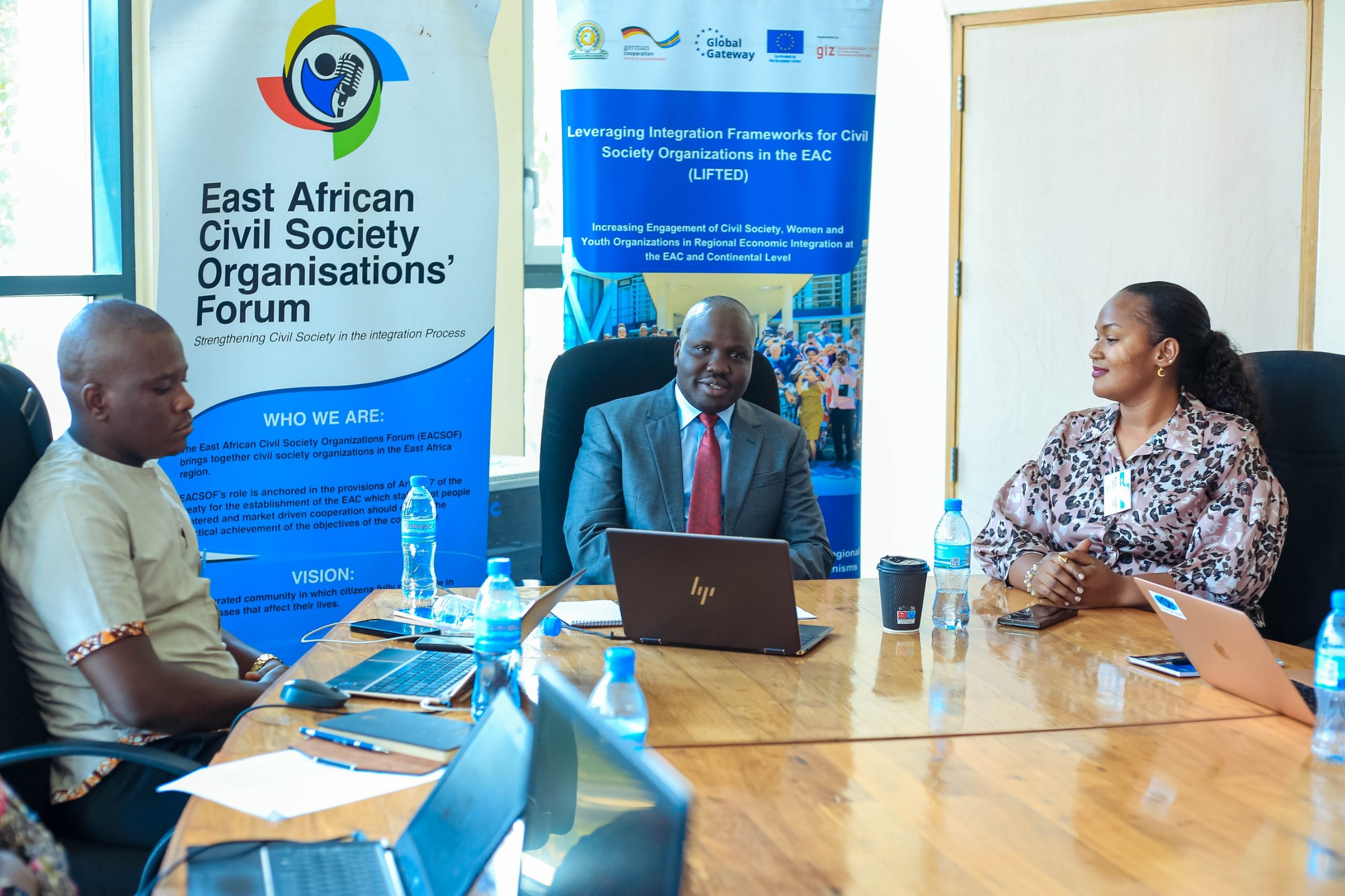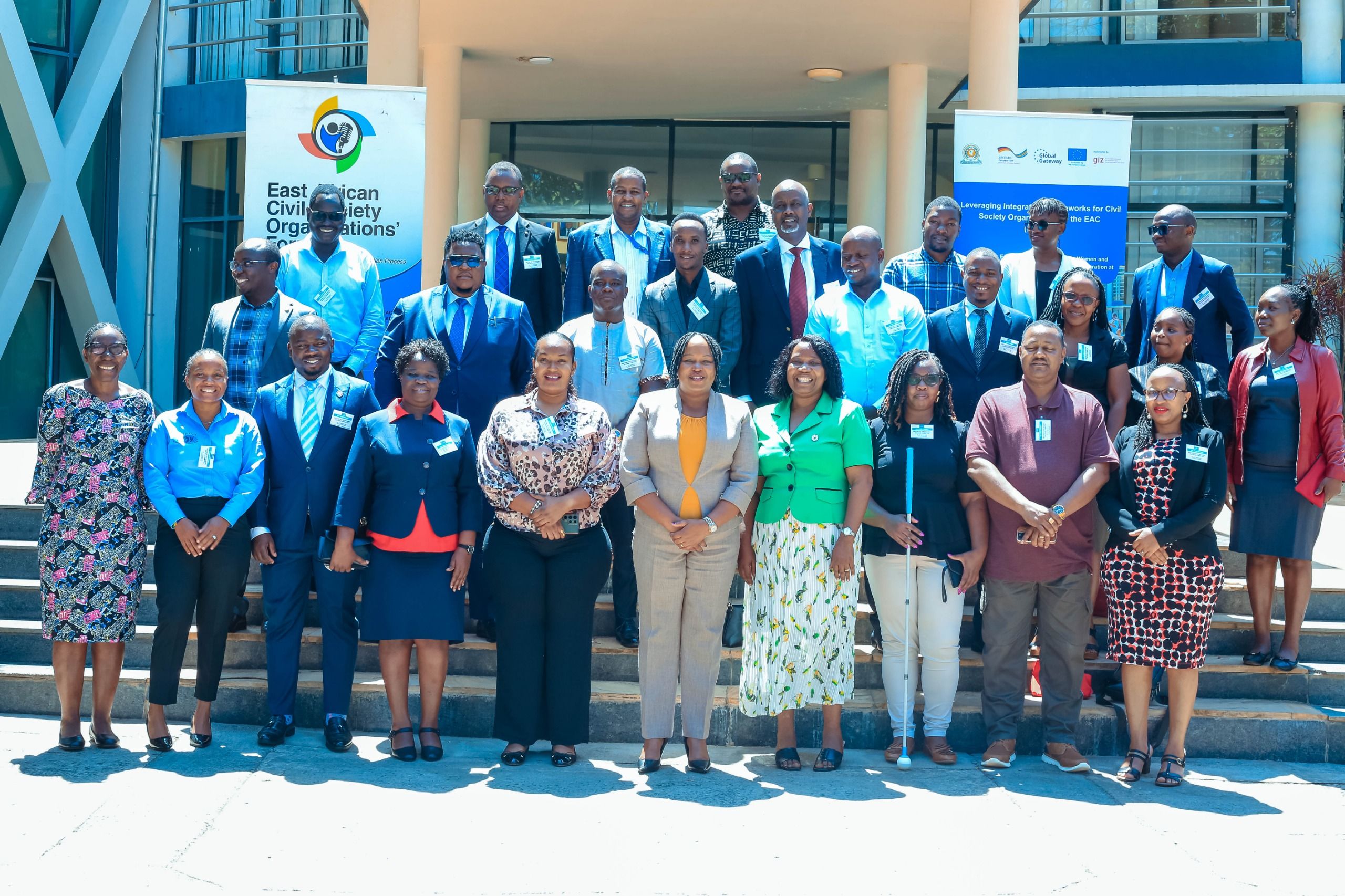Integration of civil society voices is key to driving people-centred East African integration. One of the central actors to shape and communicate these voices is the East African Civil Society Organizations Forum (EACSOF) – a regional NGO founded in 2009 in Arusha, Tanzania. It represents civil society organisations across all eight EAC Partner States. EACSOF aims to enhance civil society engagement in the EAC integration process through information sharing, networking, and capacity building.
According to EACSOF, their role in regional integration has increased significantly in the last year. “Until 2024, the East African Civil Society Organizations Forum– EACSOF–observed a troubling trend as CSOs across East Africa were increasingly excluded from critical regional decision-making processes “, recalls EACSOF Executive Director Ms Lilian Alex. “We’ve seen policies shaping governance, trade, and economic systems created without our input, leaving significant gaps in representation and accountability,” she explains further.
“But slowly and surely we are changing the way policies are shaped.” Partnering with EAC and GIZ through the EU co-funded “Leveraging Integration Frameworks for Trade in Services and CSOs in the EAC” (LIFTED) Project, EACSOF embarked on a transformative initiative that goes beyond merely advocating for inclusion—it is a catalyst for real change. “Today, CSOs are no longer passive observers. We are active architects of policy, ensuring that integration processes truly reflect the voices, priorities, and needs of the communities we serve,” Ms Alex emphasises.
What once seemed like fragmented efforts have now united into a cohesive movement, one that is significantly influencing decision-making at the highest levels. “Under my leadership and now with the timely support of the EU, EACSOF is not just calling for change; we are driving it. Our collective power as CSOs is reshaping the region’s governance landscape, making it more inclusive and accountable,” she adds.
Through LIFTED, various transformative initiatives have been undertaken to enhance the engagement of CSOs in the integration process. Firstly, EACSOF and the EAC have jointly facilitated national-level consultations in all EAC Partner States, bringing together over 230 CSO networks, government officials, policymakers, and private sector representatives. These consultations are not just discussions—they are actively reshaping the region’s policy landscape by identifying barriers, proposing solutions, and advocating for greater CSO involvement in economic integration. As a result, national and regional policy frameworks governing CSO operations are being revised to align with the EAC’s broader integration goals. This collaborative process ensures that civil society is not only included but also recognised as an essential force in shaping governance frameworks, economic policies, and civic space regulations.
Secondly is the implementation of the now-active Consultative Dialogue Framework (CDF), which provides a roadmap for the role of CSOs in driving the EAC integration agenda. The CDF is not just a policy tool; it is a vital channel through which civil society can influence trade facilitation, policy reforms, and regional governance. As a result, high-level engagement has expanded, with CSOs now contributing to platforms like the East African Secretary General’s Forum and various technical working groups.
The impacts of CSOs driving policy decision-making in economic integration are already evident across the region. In Mogadishu, Somalia, for instance, national CSO forums have enhanced civil society’s role in economic stabilisation and regional trade policies, creating a more structured and engaged civic space. In Tanzania and Kenya, CSOs are leading public awareness campaigns on EAC economic policies, ensuring that communities are better informed, more engaged, and demanding more inclusive governance. These efforts are not only shaping policy discussions but also influencing legislative reforms and regulatory frameworks that will define the future of East African integration.
Beyond governance, the initiative has significantly advanced gender-responsive policies and youth participation in economic integration. Women and youth organisations are now actively involved in trade negotiations, policy dialogues, and economic development planning, despite being historically under-represented in policy forums. Their inclusion is diversifying civic engagement, ensuring that regional policies reflect the interests of all sectors of East African society, not just a select few.
Further, joint consultations between the EAC and CSOs to institutionalise the CDF will ensure sustainable engagement mechanisms that allow CSOs to continue contributing to regional governance and policy discussions. “The partnership and collaboration between EACSOF, EAC and GIZ continues to redefine civil society’s role in East African integration. Through inclusive dialogue platforms, empowered CSOs, and strengthened governance mechanisms, this collaboration proves that a people-centred integration process is not just an aspiration—it is a necessity for sustainable regional development,” Ms Lilian Alex concludes.
Looking ahead, the success of expanding CSO influence in policymaking, improving governance structures, and advocating for regulatory reforms will serve as a model for other regional economic blocs across Africa. By strengthening institutional frameworks and promoting continuous advocacy, we are building long-term partnerships and laying the foundation for a more integrated, citizen-driven region—one where civil society is not just present but instrumental in shaping the region’s future.
Find more information on LIFTED here. Find more information on EACSOF here. Find more information on EAC here.

